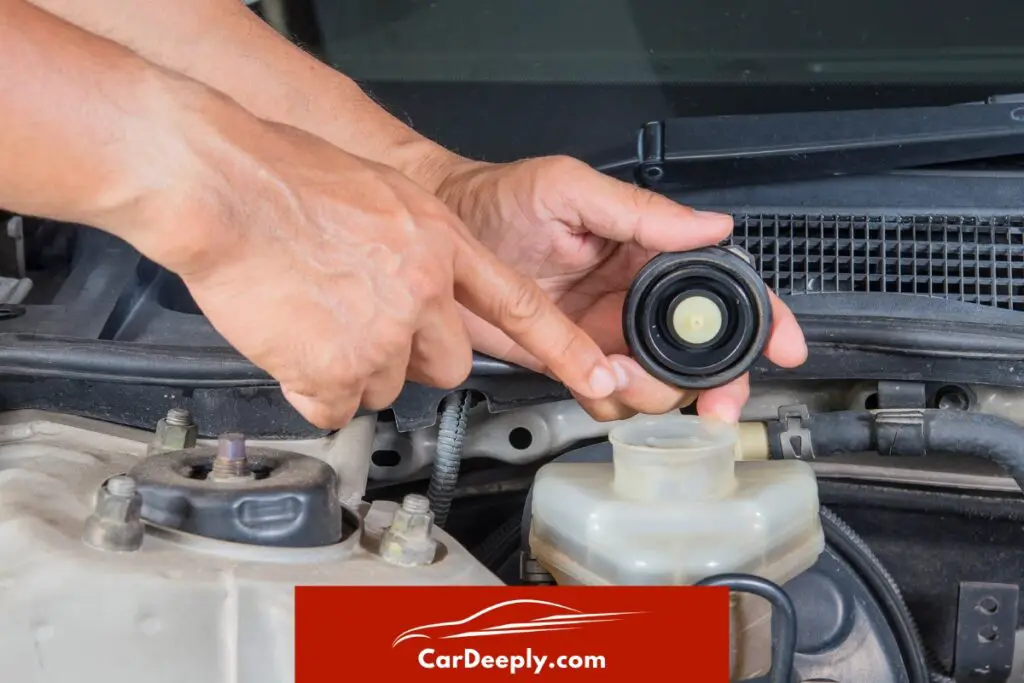Experiencing a loss of brake fluid in your RAV4 can be a daunting issue. As a seasoned automotive expert, I’ve seen and solved this problem countless times.
This comprehensive guide will give you the knowledge and practical advice you need to tackle this issue head-on.
You’ll learn about:
- The common causes of brake fluid leaks in RAV4s.
- How to identify and locate these leaks effectively.
- Practical, step-by-step solutions to fix the problem.
By the end of this article, you’ll be well-equipped to handle brake fluid loss in your RAV4 confidently and safely.
So, buckle up, and let’s dive right in!
Advertising links are marked with *. We receive a small commission on sales, nothing changes for you.
Key Takeaways

- Brake fluid is vital for your RAV4’s braking system, affecting performance and safety.
- Symptoms of a brake fluid leak include a spongy brake pedal, warning lights, and visible leaks.
- Common causes of leaks include damaged brake lines, faulty brake master cylinders, and worn brake calipers.
- Locating a brake fluid leak involves inspecting the ground, brake lines, master cylinder, and brake calipers.
- Fixing a brake fluid leak may require DIY fixes or professional help, depending on the cause.
Understanding Brake Fluid and Its Importance
Brake fluid is a type of hydraulic fluid that plays a crucial role in your RAV4’s braking system. It’s the lifeblood that keeps your brakes working smoothly and effectively.
When you press the brake pedal, the brake fluid transfers this force into pressure to the front and rear brakes.
This process slows down your vehicle and brings it to a stop.
The Importance of Brake Fluid in Your RAV4
Brake fluid is more than just a liquid in your car; it’s a safety essential. Without it, your RAV4’s brakes wouldn’t function, making it impossible to stop your vehicle.
- Performance Impact: Brake fluid directly affects your RAV4’s braking performance. If the fluid level drops, your brakes might feel spongy or unresponsive. In severe cases, your vehicle might not stop, putting you at risk of an accident.
- Safety Risks: Driving with low brake fluid is like playing with fire. It’s not just about the risk of brake failure; it’s also about the potential damage to your brake system. Low fluid levels can lead to overheating and wear of brake components, leading to costly repairs.
How to Check Your Brake Fluid Levels
Checking your brake fluid levels is a simple yet crucial task. Here’s a step-by-step guide to help you:
- Locate the Reservoir: The brake fluid reservoir in your RAV4 is typically located near the back of the engine bay. It’s a small, clear container with a black or yellow cap.
- Check the Level: Look at the side of the reservoir. You’ll see two lines: one for “Max” and one for “Min.” Your brake fluid level should be between these two lines. You must add more fluid if it’s near or below the “Min” line.
- Inspect the Fluid: Brake fluid should be clear or light yellow. If it’s dark or dirty, it’s time for a change.
Remember, brake fluid is not just about quantity but also quality. Regular checks will ensure your RAV4’s brakes are always in top shape.
Spotting the Symptoms of a Brake Fluid Leak
Brake fluid leaks in your RAV4 can manifest in several ways. These symptoms can help you catch the problem early and avoid potential damage or accidents.
- Unusual Brake Pedal Behavior: One of the first signs you might notice is a change in the feel of your brake pedal. If it feels spongy or sinks to the floor when you press it, it indicates a potential brake fluid leak.
- Warning Lights on Your Dashboard: Your RAV4 has a brake warning light on the dashboard. This light is designed to alert you when there’s a problem with your braking system, including low brake fluid levels. If this light comes on, it’s time to check your brake fluid.
- Visible Fluid Leaks: Brake fluid is a clear or yellowish fluid. If you notice this fluid leaking underneath your car, especially near the wheels or engine, it could be a sign of a brake fluid leak.
Understanding the Causes of Brake Fluid Leakage
A variety of issues can cause brake fluid leaks. Understanding these can help you identify and address the problem more effectively.
- Damaged Brake Lines or Hoses: Your RAV4’s brake system includes a network of lines and hoses that carry brake fluid from the reservoir to the brakes. These components can become damaged over time due to wear and tear, leading to leaks.
- Faulty Brake Master Cylinder: The brake master cylinder is a key component of your RAV4’s brake system. It converts the force you apply to the brake pedal into hydraulic pressure. If the master cylinder develops a leak, it can lead to a loss of brake fluid.
- Worn Brake Calipers: Brake calipers are part of the disc brake system in your RAV4. They house the brake pads, and when you apply the brakes, they squeeze the pads against the brake rotors to slow down your vehicle. Over time, the seals in the brake calipers can wear out and start to leak brake fluid.
Locating a Brake Fluid Leak in Your RAV4
Once you’ve identified the symptoms and understood the potential causes, the next step is to locate the source of the leak. Here’s how:
- Inspect the Ground: Start by checking the ground underneath your RAV4. You might see a puddle of clear or yellowish fluid if there’s a leak.
- Check the Brake Lines and Hoses: Look at the brake lines and hoses for signs of damage or leaking fluid. Pay special attention to the areas where the lines and hoses connect, as these are common spots for leaks.
- Examine the Brake Master Cylinder: The brake master cylinder is usually located near the firewall on the driver’s side of the engine bay. Check it for signs of leaking fluid.
- Inspect the Brake Calipers: Check the brake calipers at each wheel for signs of leaking fluid. If you see liquid outside the caliper or the brake rotor, it’s likely a caliper leak.
Addressing a Brake Fluid Leak: DIY or Professional Help?
Once you’ve located the source of the brake fluid leak, the next step is to fix it. Depending on the cause of the leak, you can fix it yourself, or you may need to seek professional help.
- DIY Fixes: If the leak is due to a damaged brake line or hose, you can replace it if you’re comfortable with car repairs. You’ll need the right tools, replacement parts, and a good understanding of your RAV4 brake system.
- Professional Help: If the leak is due to a faulty brake master cylinder or worn brake calipers, it’s best to seek professional help. These complex components require specialized knowledge and tools to repair or replace.
Remember, your safety is paramount. If you need more confidence in fixing a brake fluid leak, seek professional help. It’s better to be safe than sorry.
Frequently Asked Questions
How often should I check the brake fluid in my RAV4?
It’s a good practice to check your brake fluid levels every time you get an oil change or at least twice a year. Regular checks can help spot leaks early and keep your brake system in shape.
Can I use any brake fluid for my RAV4?
No, it’s important to use the type of brake fluid recommended by Toyota for your specific RAV4 model. Using the wrong type of brake fluid can damage your brake system and affect its performance.
What happens if I drive my RAV4 with low brake fluid?
Driving with low brake fluid can lead to brake failure, as there won’t be enough fluid to transfer the force from the brake pedal to the brakes. It can also cause damage to your brake system due to overheating and wear.
How much does fixing a brake fluid leak in a RAV4 cost?
The cost to fix a brake fluid leak can vary widely depending on the cause of the leak. For example, replacing a brake line or hose might cost a few hundred dollars, while replacing a brake master cylinder or brake calipers can cost several hundred dollars or more.
Can I top up the brake fluid in my RAV4 myself?
You can top up the brake fluid if you’re comfortable with car maintenance. However, it’s important to use the right type of brake fluid and not overfill the reservoir. If you’re not sure, it’s best to seek professional help.

Sebastian loves convertibles and drove a BMW 335i for a long time (325 hp is just a dream). Today, with two children, he is more concerned with SUVs and family-friendly vehicles. In addition to an Audi A4 Avant, he also drives a Cupra Formentor VZ – even as a family man, you can’t do without speed. Get to know Sebastian better and visit the About Us page.
Advertising links are marked with *. We receive a small commission on sales, nothing changes for you.

